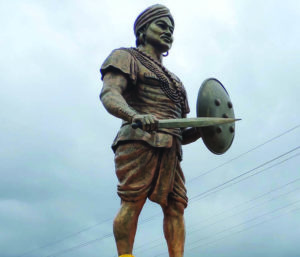
U Tirot Sing, a great patriotic son of the Khasi Hills, the pioneer freedom fighter against the colonial rule of the British, fought tooth and nail to protect his motherland from the clutches of the colonisers; but ultimately had to surrender to his enemies due to some conspiracy. He fought against the British Army with bows and arrows not longer than two hundred years; but his undauntable spirit and courage, and skilled fighting techniques achieved him great heights. His extraordinary skills at guerilla fighting, created terror among the British Army, many of whom had a firsthand encounter at that. President of Bharat Vidya Bhavan, Dr K.M. Munshi in his book, ‘British Paramountcy and Indian Renaissance – Part II’ highly appreciated Tirot Sing’s guerrilla tactics, and compared him with the great Maratha King, Shivaji.
Sing was a smart young man of exceptional calibre, possessing in depth qualities of mutual understanding and adjustment. He was well conversant with a number of languages like Bengali, Assamese, Garo, Mikir, apart from Khasi which made him popular in the neighbouring states.
U Tirot Sing was a great patriot first, then a great freedom fighter. To him, his motherland was next to his mother. Protection of its sanctity was the primary goal of the great leader.
During 1824, when David Scott, an agent to the East India Company, approached Sing, Syiem of Nongkhlaw with the request of seeking permission for constructing a link road through the Khasi Hills for the British troops, Tirot Sing with due consultation of his Durbar agreed to the proposal; but there were some conditions that the British Raj should not interfere with any internal affairs of the state. The British government, however, failed to keep the terms and conditions of the treaty and imposed revenue on the Nongkhlaw state. Scott had an ulterior motive which was his interest in the duars or passes to Assam. As Sing sniffed this motive, here began a point of contention leading up to a full fledged conflict.
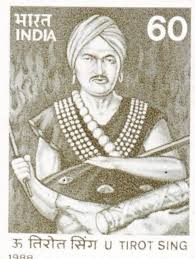 Tirot Sing, united with other chiefs of the hills, was determined to drive out the colonisers from his motherland. On April 4 1829, Sing sent a band of Khasi warriors and declared war against Lt. Burlton at Nongkhlaw. Thousands of young men and women unitedly joined Tirot Sing to fight against the foreign power.
Tirot Sing, united with other chiefs of the hills, was determined to drive out the colonisers from his motherland. On April 4 1829, Sing sent a band of Khasi warriors and declared war against Lt. Burlton at Nongkhlaw. Thousands of young men and women unitedly joined Tirot Sing to fight against the foreign power.
It was the first uprising against the British power, in the Northeast region of India, headed by Tirot Sing, and is famously known as ‘Nongkhlaw Massacre’ (Alexander Mackenzie “memorandum 1869”).The British garrison in Nongkhlaw was attacked where Sing’s men killed two British officers, Richard Gurdon Bedingfield and Philip Bowles Burlton. However, their primary target, Scott had escaped and in retaliation, British military operations began against U Tirot Sing and other Khasi chiefs.
It is a matter of great credit that Sing, himself could send shockwaves and instil fear among the powerful British rulers. Sing and his regiment equipped only with bows and arrows, two-handed swords, shields, and bamboo rods fought tooth and nail against the British administrators in the hill region.
After months of stiff and stern resistance against the well equipped British Army, the exhausted Khasi warriors had to retreat towards the hills, but on the way the fiercest battle took place, resulting in the death of many foreign soldiers and officers. Many Khasi warriors were also badly injured and killed in the battle.
The ‘Battle of Nongkhlaw’ or the Anglo-Khasi War dragged on for almost four years. “It was the bloodiest war we had ever encountered,” said Mr. Pamberton (‘Tirot Sing’ by J.E. Taring pg. 33)
Thousands of foreign troops were slain in the scattered battlefields and hundreds of the courageous Khasi warriors fell in defence of their dear motherland. David Scott observed the strong determination of Tirot Sing and his followers and came to the decision that so long Tirot was free and alive, there was no hope of a safe solution. He devised the method of ‘divide and rule’ by sowing seeds of distrust among the top leaders of Tirot Sing.
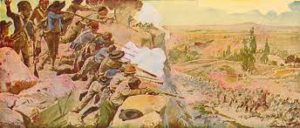
Sing Manik, the chief of the Khyriem estate, offered his service to the British to negotiate between the Khasi and the British for some peaceful settlement. He arranged a meeting between Sing and the British, at Nongkhlaw on August 19, 1832; but Sing declined to meet the British officer, who came to the meeting fully armed. Sing demanded that the parties should attend the meeting unarmed, and accordingly the meeting was held on August 23, 1832.
The British representative gave a solemn promise to spare the life of Tirot Sing and his followers, provided Sing signed the treaty with the British, acknowledging their suzerainty.
The bold reply came from Tirot Sing – ‘Better die an Independent King than reign as the Vassal’! The brave hero had the courage to say ‘No’ to the powerful imperialists, well aware of its dire consequences.
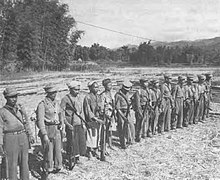
As a result of the prolonged war, the common people of the Khasi Hills had been suffering miserably. They had either lost a husband, brother or son in the war and many families became helpless which pained Tirot Sing deeply. Moreover, he was shocked to get the whiff of some of his very faithful supporters deceiving him; they even disclosed Tirot Sing’s secret hideout in the cave, to the opponents. Deeply shocked by these developments Tirot made up his mind to surrender, for the sake of his countrymen, knowing fully well his resultant fate; but his spirit of patriotism and self respect could not be daunted.
On January 13, 1833, the great warrior surrendered gracefully to the British officer Captain Inglis, at Lum Mardiang, near Elephant Falls, Shillong. At that fateful moment of surrender, Tirot conveyed his love and gratitude to his beloved countrymen, whose love and devotion he cherished till the last moment of his life. His only request to the British was granting full justice to the rights of his countrymen.
Tirot Sing was then sent to Dacca jail for detention. When Tirot Sing arrived at Dacca, he was treated inhumanely. He was not allowed any personal belongings other than a blanket to cover his body. The great patriot bravely said, ‘I have come from a royal family and I claim royal treatment’.
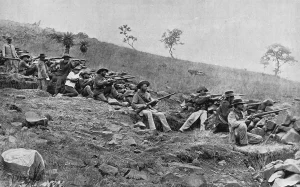
Ultimately, the British government had to issue a special order to treat him as a State prisoner and thereafter Sing was granted an allowance of Rs 63 with permission to engage two servants. (March 19, 1833 p.c. No. 55)
Tirot Sing spent his last days, (almost two years), in confinement, in despair and disgust. Nothing is known so far regarding the physical and mental condition of the great leader in British custody. During that time it was an arduous task to get to Dacca from the Khasi Hills, because there was no motorable road; and people in urgency had to cross the hills on foot. Therefore, the people of the Khasi Hills could not maintain any proper line of communication with their beloved leader in confinement.
It was on July 17, 1835, U Tirot Sing, the pioneer freedom fighter of Meghalaya, died in British custody in Dacca jail at a ripe age of 40. Despite his undaunted spirit and vigour, unfortunate Sing fell victim to the conspiracy of his own kinsmen, and surrendered to death under British custody.
Till his last breath under British custody he prayed for the welfare of his motherland but did not surrender to the colonising power.
It came as a shock to the people to learn about the sudden demise of their strong, bold and admirable young hero, Tirot Sing. To them it was a mystery. Silent questions remained, how did his last moments come? How did a stout young man like Tirot Sing expire? Was he hanged to death by the British?
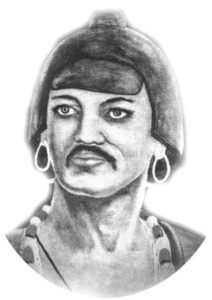
A low moment in history was that his mortal remains were not brought back to his motherland which was a great tragedy! Tirot Sing was a great revolutionary, who embraced death revolting against the British, but the people of the time were fearful of approaching the British to bring his corpse to his land and his people.
Such a burning spirit of patriotism and valour of a martyr like Tirot Sing should not remain confined in Meghalaya only. Sing was a freedom fighter, who fought gallantly against the British since 1824, the primary period of the Freedom movement in India. U Tirot Sing should be considered as one of the pioneer Freedom fighters of India, and the history of his fierceful struggle against the British with his undeterred spirit and courage should be known by each and every citizen of India.
July 17, the day of the tragic demise of U Tirot Sing is observed in Meghalaya, as ‘U.Tirot Sing’s Day’; it may be renamed as ‘Martyr’s Day’ to recognise the outstanding sacrifice of U Tirot Sing, the true patriotic son of the Khasi Hills. His exemplary patriotism and intrepidity should not remain stagnant in the State of Meghalaya but be spread all over India, to record Sing’s name as one of the Pioneer Freedom fighters of Mother India. He should not remain unsung in the history of the Freedom struggle of India.



